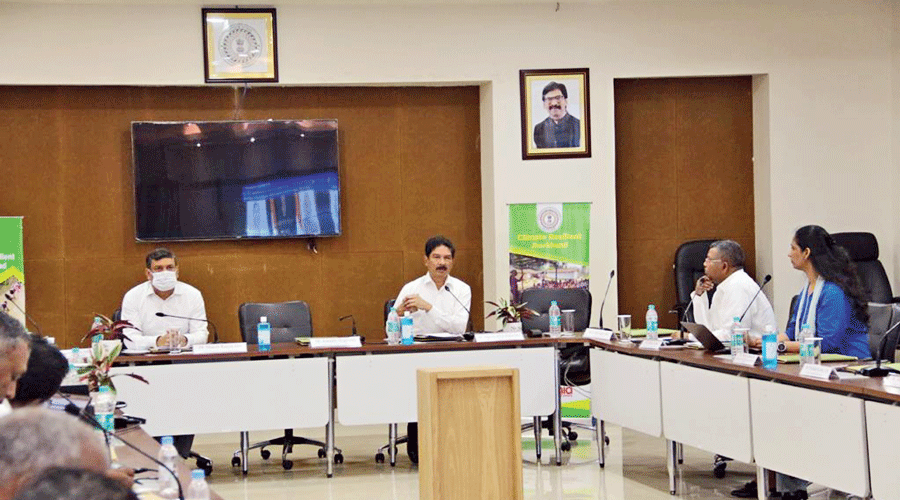Bureaucrats and experts brainstormed on the implementation of the Jharkhand Climate Resilience Information System and Planning (JHAR-CRISP) tool to help rural communities deal with climate change as the state is staring at the spectre of drought and associated water stress.
The discussion during a technical workshop organised in Ranchi on Wednesday had Union rural development secretary N.N. Sinha stating that the tool was especially relevant in Jharkhand.
Quoting from his experiences during his tenure as a bureaucrat in Jharkhand, Sinha said: “This tool is especially relevant in a state like Jharkhand, due to its climate vulnerability."
The JHAR-CRISP tool was officially launched by chief minister Hemant Soren along with British High Commissioner to India, Alex Ellis, on Tuesday.
Sinha emphasised the need to establish convergence between all relevant departments and have multi-sectoral planning to ensure that the incomes of farmers can be increased, create more self-sustainable and diversified livelihoods and incorporate climate resilient practices into their lives.
“Jharkhand has tremendous potential and with the right planning and coordination between departments they can combat the challenges of climate change head-on," added Sinha.
Principal secretary to the chief minister, Rajeev Arun Ekka, in his keynote address said that the JHAR-CRISP tool is a potential game changer and will help the state better manage climate impacts.
“The tool shouldn’t be limited only to MGNREGS-related activities. There is a need for a holistic approach to implementation of the tool,” said Ekka while urging that the only way to tackle climate change is through a bottom-up approach and proper planning and coordination between all relevant stakeholders to ensure this tool is utilised to its full potential.
Rural development secretary of Jharkhand, Manish Ranjan, said that the transition from old to new methods is often a challenge in implementation and it is necessary to ensure that the community is taken into confidence while introducing this tool. He discussed the tool in the context of the theory of change and how its outputs will have wide-ranging outcomes at different levels.
The tool has been designed and developed by the International Institute for Environment and Development (IIED) in collaboration with a range of expert organisations and includes a drought early-warning system. It also provides communities with information like changes in groundwater status, runoff, rainfall pattern and so on under future climate scenarios that help with long-term planning to conserve water.
Johnson Topno, regional head of the programme in PHIA Foundation which will lead in scaling up the JHAR-CRISP tool in Jharkhand, said that while they plan to set up a programme management unit at the state level, their focus will be on creating awareness among the field-level government functionaries and communities of the utility of the tool and building their capacity to use it so that they can be better equipped to manage climate impacts in future.
He also mentioned that while they will initiate the effort by using the tool for MGNREGS implementation, they are also having discussions with other departments like environment and forests, and water resources on how to use the tool to manage forest and water resources across the entire area fed by the same river basin.
The development and scale-up efforts around the tool are being supported by the Infrastructure for Climate Resilient Growth Programme (ICRG) initiative of the UK Foreign Commonwealth and Development Office (FCDO).










